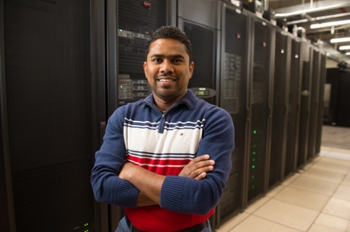SIUE Computer Science Program Proactively “Sprinkles Security” into Studies
 In a world full of computerized information and rapid advances in technology, the need for cybersecurity is paramount for both personal privacy and national security. Southern Illinois University Edwardsville is taking an innovative approach in training future computer scientists to combat this pressing concern.
In a world full of computerized information and rapid advances in technology, the need for cybersecurity is paramount for both personal privacy and national security. Southern Illinois University Edwardsville is taking an innovative approach in training future computer scientists to combat this pressing concern.
With support from the SIUE Center for Science, Technology, Engineering and Mathematics (STEM) Research, Education and Outreach, Thoshitha Gamage, assistant professor of computer science, is introducing cybersecurity concepts throughout the program’s core curriculum. In addition to his regular course load, Gamage is working as a faculty fellow through the STEM Center for the academic year.
“A central goal of the STEM Center is to support interdisciplinary teams of SIUE faculty to conduct innovative projects in STEM education,” said Sharon Locke, director of the SIUE STEM Center. “Dr. Gamage’s project addresses one of the grand challenges in engineering, as identified by the U.S. National Academy of Engineering – “Securing Cyberspace.”
“In this day and age, everything is digitalized,” said Gamage. “Our cellphones, cars, computers, tablets and more involve a cyber security component. There’s always a chance someone else can access that information.”
Gamage stresses that cybersecurity can no longer be considered a non-functional requirement as it historically has been. Instead, he says it needs to be infused as systems are built.
“I’m taking the opportunity to expose students to cybersecurity in a more unconventional way,” Gamage explained. “Instead of students waiting to take an upper-level course dedicated solely to cybersecurity, all of our core curriculum will have certain concepts “sprinkled” in. In addition, our introductory programming courses will include security minded labs appropriate for that audience.
“It goes back to the notion of making security a functional component of the design process,” he added. “Nothing is absolutely secure, but we can make sure that obvious loopholes are covered to prevent systems from being exploited.”
Gamage contends that his fellowship with the STEM Center has made this innovative course augmentation possible. His next immediate goal is to make the initiative sustainable.
“The STEM Center funds pilot studies, and we then collaborate with the fellows to prepare proposals to external funding agencies for additional research and institutionalization of effective STEM education practices,” Locke said.
“This project helps keep SIUE at the cutting edge of computer science education,” she continued. “In working with Dr. Gamage, the STEM Center plans to seek funding for scholarships to support SIUE students interested in studying cybersecurity.”
SIUE’s computer science program has experienced notable growth as global demand for computer scientists has increased. According the U.S. Dept. of Labor Bureau of Labor Statistics, employment of computer and information research scientists is projected to soar 15 percent through 2022, faster than the average for all occupations.
Photo: Thoshitha Gamage, PhD, assistant professor of computer science.









